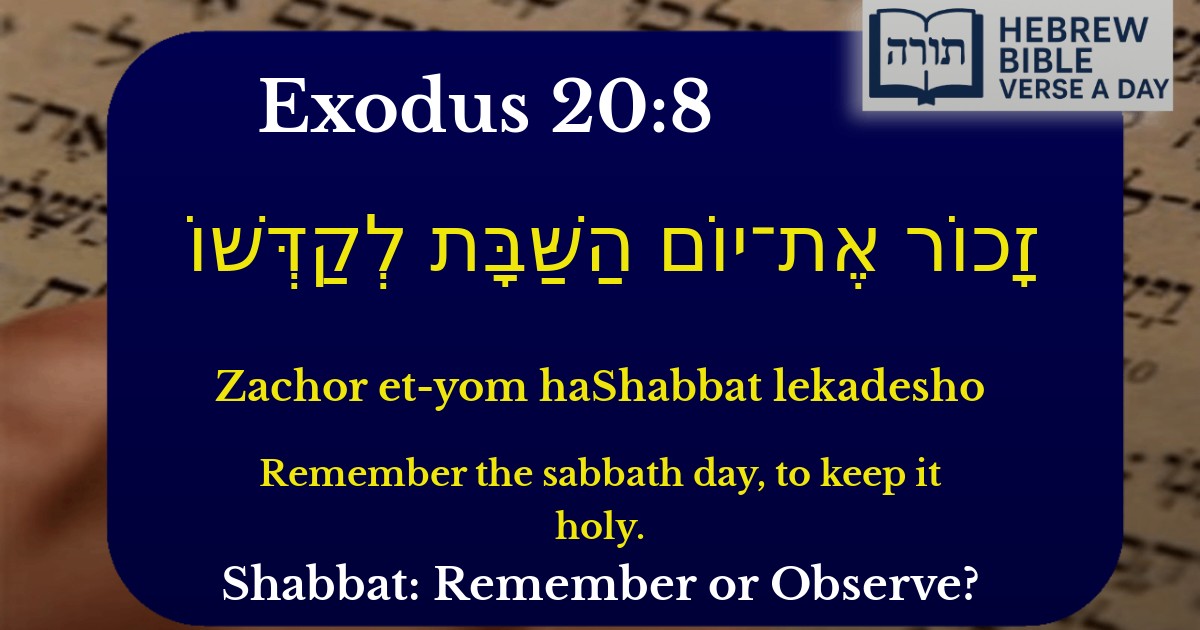Frequently Asked Questions
Q: What does 'Remember the Sabbath day, to keep it holy' mean?
A: This verse is the fourth of the Ten Commandments, instructing us to remember and observe Shabbat (the Sabbath) as a holy day. According to Rashi, 'remember' means to constantly be mindful of Shabbat, even during the week, by preparing for it in advance. 'To keep it holy' refers to sanctifying the day through special prayers, meals, and refraining from work (melacha) as defined by Jewish law.
Q: Why is remembering Shabbat so important in Judaism?
A: Shabbat is a foundational mitzvah (commandment) that commemorates Hashem's creation of the world (as stated in Exodus 20:11) and our Exodus from Egypt (Deuteronomy 5:15). The Talmud (Shabbat 118b) teaches that observing Shabbat properly is equivalent to observing the entire Torah. Rambam (Hilchot Shabbat 30:15) emphasizes that Shabbat brings spiritual elevation and rest to both body and soul.
Q: How do we 'remember' Shabbat according to Jewish tradition?
A: Jewish tradition teaches several ways to fulfill 'remembering' Shabbat: 1) Reciting Kiddush on Friday night (Mishna Berurah 271:1), 2) Counting the days of the week in relation to Shabbat (e.g., 'Today is the first day toward Shabbat') - based on Mechilta on this verse, 3) Preparing for Shabbat during the week by setting aside special foods or finishing work before Shabbat begins (Beitza 16a).
Q: What does it mean to 'keep Shabbat holy' in practical terms?
A: Keeping Shabbat holy involves both positive commandments (like making Kiddush, enjoying three meals, and wearing special clothes) and negative commandments (refraining from the 39 categories of creative work). The Shulchan Aruch (Orach Chaim 242-344) details these laws. The Midrash (Shemot Rabbah 25:12) explains that our Shabbat observance should be noticeably different from our weekday routine.
Q: How does this commandment apply to Jews today?
A: This commandment remains fully binding on all Jews today. The Chofetz Chaim (Mishna Berurah introduction) writes that proper Shabbat observance protects the Jewish people. Modern halachic authorities like Rav Moshe Feinstein (Igrot Moshe) have addressed contemporary Shabbat questions (e.g., electricity, elevators) while maintaining the Torah's fundamental requirements. Many find that Shabbat observance provides essential spiritual renewal in our busy modern lives.


The Mitzvah of Zachor et Yom HaShabbat
The verse "זָכוֹר אֶת־יוֹם הַשַּׁבָּת לְקַדְּשׁוֹ" (Shemot 20:8) is the first of the Ten Commandments pertaining to Shabbat. The commandment to "remember" the Sabbath day is understood by Chazal as encompassing both positive and negative obligations related to Shabbat observance.
Rashi's Explanation
Rashi comments that "זָכוֹר" (remember) and "שָׁמוֹר" (guard) were said simultaneously at Har Sinai, teaching that we must both actively sanctify Shabbat (through Kiddush) and refrain from melachah (forbidden labor). This dual aspect is derived from the way these two commandments appear in different places in the Torah (Shemot 20:8 and Devarim 5:12).
Rambam's Perspective
In Mishneh Torah (Hilchot Shabbat 29:1), the Rambam explains that "זָכוֹר" includes the obligation to verbally sanctify Shabbat through reciting Kiddush. He states this is a Torah commandment, derived from the phrase "לְקַדְּשׁוֹ" (to sanctify it).
Talmudic Sources
Kabbalistic Dimension
The Zohar (Parashat Yitro) explains that "זָכוֹר" refers to the masculine aspect (Zeir Anpin) while "שָׁמוֹר" relates to the feminine (Malchut), showing how Shabbat unites the spiritual realms. The sanctification ("לְקַדְּשׁוֹ") elevates the physical world through Shabbat observance.
Practical Halachic Applications